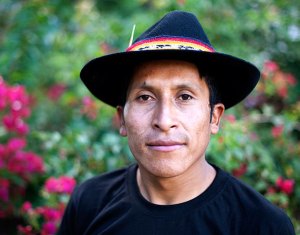
Among the nearly 90,000 active contributors to Wikipedia, there are many different motivations for editing. For some, it’s a hobby; for others it’s a mission to advance free knowledge. For Ruben Hilare-Quispe, contributing to Wikipedia is a way to promote and protect his language and culture.
“It’s a kind of inward love for your language,” said Hilare-Quispe, who contributes to Aymar Wikipidiya, one of 284 language versions of the free encyclopedia. Aymar Wikipediya has just under 2,000 articles, with 30 active users, many of whom Hilare-Quispe has helped organize.
“You write because you love your language and you belong to that culture, because your family doesn’t have content already on the Internet,” he said. “It happens frequently that when you want content in Aymara, it just doesn’t exist.”
Hilare-Quispe lives in El Alto, Bolivia, where he works part-time for the Bolivian Quaker Education Fund. Like many younger Aymaras, he grew up bilingual, learning Spanish in school and speaking Aymara at home with his family. Aymara is an indigenous language to South America, with 3 million speakers worldwide, primarily concentrated in the Andes. It has been recognized as an official language of Bolivia and Peru.
Hilare-Quispe first started contributing to Aymar Wikipidya as part of the Jaqi Aru project, which he helped establish. Jaqi Aru, which means “voice of the people” in Aymara, is a community of approximately 40 young Aymarans dedicated to promoting the use of the Aymara language on the Internet. Jaqi Aru’s efforts are focused on making Aymara content available online, and their activities include uploading Aymara videos on Youtube, participating in the Global Voices Online Project Lingua as Aymaran translators, and of course, writing for Wikipedia in Aymara.
“We had been looking for some opportunity to write and make content online,” said Hilare-Quispe. “If someone wants to look for information in Aymara, Wikipedia is the first page which appears, so that’s cool.”
Hilare-Quispe says the collaborative nature of Wikipedia sets it apart from Jaqi Aru’s other projects. “Wikipedia can be edited and completed later, or corrected by another person from anywhere, so that’s a big difference from what we do on blogs or on Facebook or even for Global Voices, which is just information–you can’t modify it.”
In the early days of the project, they had to go to painstaking lengths to edit. In-home Internet access in Bolivia is not widespread, so Hilare Quispe and his community went to Internet cafes, where they found articles in Spanish, English or French Wikipedias, and clicked the “edit” button and copied the full text of the article, including the wiki-markup. They saved the articles offline and took them home or to school to translate into Aymara, then returned to Internet cafes to upload the new articles to Aymar Wikipediya.
Now, Hilare-Quispe and the Jaqi Aru team create new articles directly in Aymara on the Aymar Wikipedia. Thanks to workshops from the group of editors seeking to form an official Wikimedia chapter in Bolivia, they understand wiki-markup, including formatting text and uploading images. Hilare-Quispe even has in-home Internet access via modem, so he no longer has to trek over to the internet cafe to download article text.
“I think Jaqi Aru as a team has had a great influence,” he said. “Now many other young people think to create websites in Aymara, most of them write on Facebook in Aymara, and they share information about their communities in Aymara.”
He also said that Wikimedia Foundation initiatives to simplify the editing process would have a positive impact on their work. Hilare-Quispe said the he hopes the Wikipedia visual editor will significantly increase the editorship for Aymar Wikipediya.
“A huge group of people already know how to write on the computer,” he said, “so that could be perfect if Wikimedia works in an easier way to edit.”
Beyond Aymara, Hilare-Quispe hopes Wikipedia will be widely used by other minority language communities to help preserve their knowledge and culture. “The goal is to spread to other native languages in Bolivia like Guaraní, Mosetén, Chipaya, or Quechua,” he said. “We can share this information [about Wikipedia] and strengthen those minority languages.”
According to Hilare-Quispe, Wikipedia has played an important role in helping Jaqi Aru accomplish its mission.
“Wikipedia allows you to participate in the worldwide population with your language, and so that’s really really important for us, for Aymaras,” he said. “When you look for something in Aymara, maybe tomorrow or in the future, someone is going to look for the same information, so when you know something you can write it. It’s just that kind of process, and that’s why I like it.”
Story and reporting by Elaine Mao, Communications Intern
Additional reporting by Matthew Roth, Global Communications Manager

Can you help us translate this article?
In order for this article to reach as many people as possible we would like your help. Can you translate this article to get the message out?
Start translation